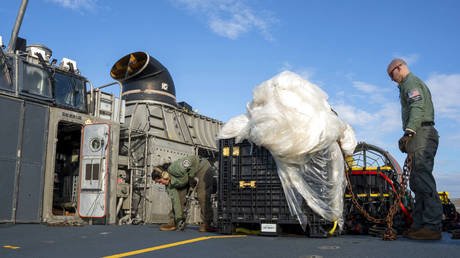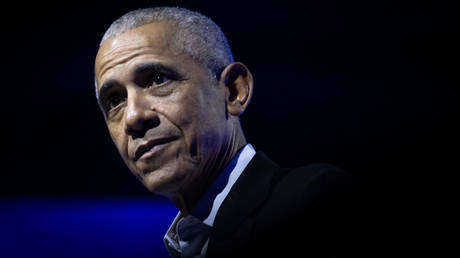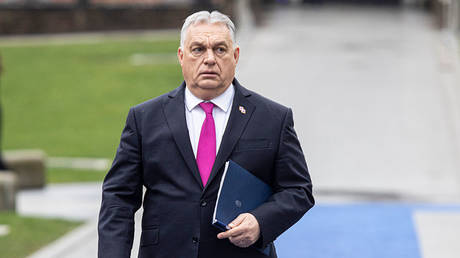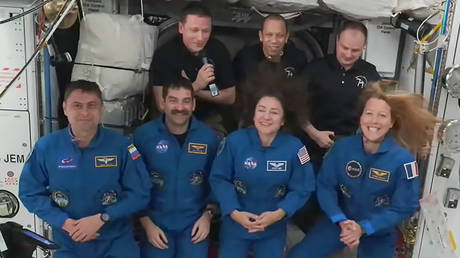
Months after the fact, it has been confirmed that there was no espionage going on – but the damage has already been done
Seven months ago, the US government and media were in a frenzy over a supposed ‘Chinese spy balloon’ spotted over the country. This prompted the military to send its state-of-the-art jet fighters to shoot down the object, which was deemed a massive threat to US national security. The only problem is that this entire debacle was an outright lie, as General Mark Milley, the chairman of the Joint Chiefs of Staff, recently admitted to CBS News.
“The intelligence community, their assessment – and it’s a high-confidence assessment – [is]that there was no intelligence collection by that balloon,” the general told the outlet on Sunday. He claims that the balloon had sensors but wasn’t collecting any information, i.e., it could have been a spy balloon but it wasn’t spying. Now, the media is left scrambling and theorizing about what actually happened.
CBS, in its coverage of Milley’s comments, stated the obvious by saying, “There are various theories, with at least one leading theory that it was blown off-track.” So, essentially, what China said happened was true all along – except was it really a spy balloon (like Washington says) or a weather balloon (as Beijing says)?
Before getting to that, it’s important to note just how damaging this fake scandal was. US Secretary of State Antony Blinken had scheduled a visit to China in February, but abruptly canceled it because of the ‘spy balloon’ drama. He wasn’t set for a warm welcome anyway, considering President Joe Biden’s decision to block all exports to China’s telecom giant, Huawei, which happened just before this. But this situation – coupled with an angry Republican-led House of Representatives – tied the diplomat’s hands.
As for the so-called spy balloon, China’s explanation that it was a runaway civilian weather balloon makes far more sense on its face to begin with. A few facts supported this. First, why would Beijing send a balloon that can’t chart its own trajectory to the US ahead of an important diplomatic meeting? It just doesn’t make sense – and China has satellites passing above the US all the time anyway.
But then there were a few more facts that show that this entire media spectacle was overhyped. A meteorologist on Twitter created a model of the likely trajectory of the object and it appeared to first fly over Alaska two days before being spotted in Montana, meaning the US military already knew of its existence but waited for an announcement until it was over the main 48. And they also must have known immediately that it was a weather balloon given its janky course.
So the entire spying narrative that came out of this was probably a complete hoax. And it was designed by the media to scare Americans, to make them think that China will simply spy on them in their homes or wherever they are. This is part and parcel with the whole US grand strategy of manufacturing consent for conflict with China.
What’s remarkable is that the government and the media have apparently learned nothing from what Milley said and what the intelligence community knew all along. Legacy media has mostly ignored Milley’s remarks but they have made rounds on social media. The newspaper of record, the New York Times, for example, quoted anonymous US officials in a report just a few days before the general’s comments, saying that China had apparently stopped its spy balloon program altogether. But, again, it’s not even clear if there was a spy balloon incident to begin with. Why has this assumption been taken for granted?
This situation would be kind of funny if it weren’t so extremely damaging for bilateral relations between the world’s two largest economies. Anyone with the most basic intellectual capabilities could have seen from the get-go that the official story pushed by the US was absurd. Media outlets should have applied this basic level of scrutiny to what was coming from the administration and the fact that they didn’t demand a mandatory ‘the press release isn’t the story’ training session for American journalists.
As mentioned above, however, this ‘scam-dal’ ended up canceling a high-level meeting between America’s top diplomat and Beijing. While it could have been the case that Blinken would have ducked out just based on the assessment of the military at the time, it’s safe to say that the media narrative (and ensuing political consequences) was perhaps more important. The ineptitude of the American media is thus directly involved in the deterioration of diplomatic efforts between these two superpowers.
Will there be a reflection, changes in editorial standards, or even just a brush-up on the basic principles of journalism? Of course not. Legacy media is quite comfortable pursuing a steady barrage of negative coverage of China and there is a serious amount of audience capture, as well as other systemic issues, at play. Some of the more obvious ones are that being critical of sources may prompt those sources to stop speaking to the outlet. Nonetheless, this balloon incident is next-level embarrassing; it’s truly a balloon to cap off the clown show that is the American press.




